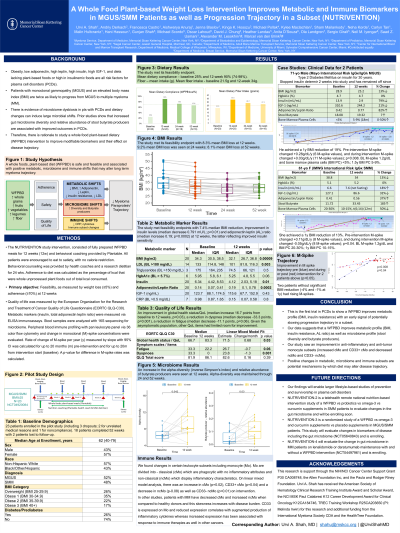QoL and Patient-Reported Outcome and Supportive Care
Poster Session 3
P-483: A Whole Foods Plant-based Weight Loss Intervention Improves Metabolic and Immune Biomarkers in MGUS/SMM Patients as well as Progression Trajectory in a Subset – The NUTRIVENTION Trial
Friday, September 29, 2023
1:15 PM - 2:15 PM EEST

.jpg)
Urvi A. Shah, MD (she/her/hers)
Assistant Attending
Myeloma Service, Memorial Sloan Kettering Cancer Center
New York, New York, United States
Introduction: Obesity, low adiponectin, high leptin, high insulin, and diets lacking plant-based foods are all risk factors for plasma cell disorders (PCDs). Therefore, there is a rationale to study a whole food plant-based dietary (WFPBD) intervention to improve modifiable biomarkers and disease trajectory.
Methods: This was a pilot, single-arm dietary intervention trial of a WFPBD for 12-weeks (w) and health coaching for 24w (by Plantable) in patients (pts) with myeloma precursor disease (MGUS/SMM) and body mass index (BMI) ≥25 (NCT04920084). The primary endpoint was feasibility at 12w; secondary endpoints included metabolic markers (insulin, adiponectin leptin ratio via ELISA at 12w), peripheral blood immune profiling by flow cytometry at 12w, and change in monoclonal (M)-spike concentrations. Rate of change of M-spike per year (y) measured by slope with 95% CI was calculated for up to 20 months (m) pre-intervention and for up to 20m from intervention start (baseline). A p-value for difference in M-spike rates was calculated.
Results: The median age was 62y with 43% male, 43% non-White, 52% MGUS, 74% obese, and 26% prediabetic/diabetic. At time of analysis 20 pts completed the 12w WFPBD intervention and 12 completed 1y of follow-up. The study met feasibility endpoints with 92% median dietary adherence, leading to 7.4% median BMI reduction, improvement in insulin levels (median decrease 0.791 mU/L; p=0.01) and adiponectin leptin (AL) ratio (median increase 0.09; p=0.0002) at 12w. There was a reduction in total innate lymphoid cells (ILCs) (p=0.03) and early NK cells (p=0.03) and an increase in classical monocytes (p=0.04) and CD33+ classical monocytes (p=0.03) (n=14).
Among 12 pts followed for 1y, 2 with significant BMI reduction on trial had a statistically significant improvement in the M-spike trajectory:
The first patient with Mayo Int Risk IgGκ/IgGλ MGUS achieved a 1y BMI reduction of 19%. Pre-intervention M-spike changed +0.28g/dL/y (6 M-spike values in 20m), and during intervention M-spike changed +0.02g/dL/y (11 M-spike values in 20m); p=0.0001. Baseline M-spike 1.2g/dL and bone marrow plasma cells (BM PC) < 5%; 1.5y BM PC 5-9%.
The second patient with IMWG Int Risk IgGκ SMM achieved a 1y BMI reduction 13%. Pre-intervention M-spike changed +0.12g/dL/y (8 M-spike values in 20m), and during intervention M-spike changed -0.05g/dL/y (8 M-spike values in 16m); p=0.009. Baseline M-spike 1.2g/dL and BM PC 20-30%; 1y BM PC 10-15%.
Two pts without significant BMI reduction (-4% and -1% at 1y) had rising M-spikes. The remaining 8 pts had median 8% BMI reduction at 1y with stable M-spike levels.
Conclusions: This is the first trial in PCDs to show a WFPBD improves metabolic profile (BMI, insulin resistance) with an early signal of potentially slowing progression trajectory in a subset of patients. Preliminary immune profiling data supports an effect on ILC and myeloid cell quantity suggestive of diet-mediated immune modulation. Additional analysis in larger sample sets is planned (NCT05640843).
Methods: This was a pilot, single-arm dietary intervention trial of a WFPBD for 12-weeks (w) and health coaching for 24w (by Plantable) in patients (pts) with myeloma precursor disease (MGUS/SMM) and body mass index (BMI) ≥25 (NCT04920084). The primary endpoint was feasibility at 12w; secondary endpoints included metabolic markers (insulin, adiponectin leptin ratio via ELISA at 12w), peripheral blood immune profiling by flow cytometry at 12w, and change in monoclonal (M)-spike concentrations. Rate of change of M-spike per year (y) measured by slope with 95% CI was calculated for up to 20 months (m) pre-intervention and for up to 20m from intervention start (baseline). A p-value for difference in M-spike rates was calculated.
Results: The median age was 62y with 43% male, 43% non-White, 52% MGUS, 74% obese, and 26% prediabetic/diabetic. At time of analysis 20 pts completed the 12w WFPBD intervention and 12 completed 1y of follow-up. The study met feasibility endpoints with 92% median dietary adherence, leading to 7.4% median BMI reduction, improvement in insulin levels (median decrease 0.791 mU/L; p=0.01) and adiponectin leptin (AL) ratio (median increase 0.09; p=0.0002) at 12w. There was a reduction in total innate lymphoid cells (ILCs) (p=0.03) and early NK cells (p=0.03) and an increase in classical monocytes (p=0.04) and CD33+ classical monocytes (p=0.03) (n=14).
Among 12 pts followed for 1y, 2 with significant BMI reduction on trial had a statistically significant improvement in the M-spike trajectory:
The first patient with Mayo Int Risk IgGκ/IgGλ MGUS achieved a 1y BMI reduction of 19%. Pre-intervention M-spike changed +0.28g/dL/y (6 M-spike values in 20m), and during intervention M-spike changed +0.02g/dL/y (11 M-spike values in 20m); p=0.0001. Baseline M-spike 1.2g/dL and bone marrow plasma cells (BM PC) < 5%; 1.5y BM PC 5-9%.
The second patient with IMWG Int Risk IgGκ SMM achieved a 1y BMI reduction 13%. Pre-intervention M-spike changed +0.12g/dL/y (8 M-spike values in 20m), and during intervention M-spike changed -0.05g/dL/y (8 M-spike values in 16m); p=0.009. Baseline M-spike 1.2g/dL and BM PC 20-30%; 1y BM PC 10-15%.
Two pts without significant BMI reduction (-4% and -1% at 1y) had rising M-spikes. The remaining 8 pts had median 8% BMI reduction at 1y with stable M-spike levels.
Conclusions: This is the first trial in PCDs to show a WFPBD improves metabolic profile (BMI, insulin resistance) with an early signal of potentially slowing progression trajectory in a subset of patients. Preliminary immune profiling data supports an effect on ILC and myeloid cell quantity suggestive of diet-mediated immune modulation. Additional analysis in larger sample sets is planned (NCT05640843).
